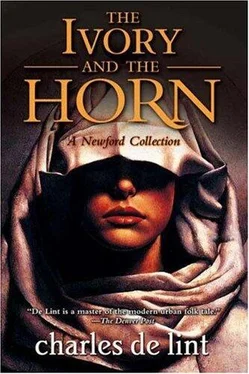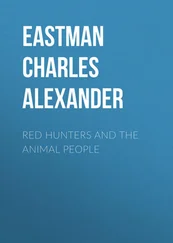"I guess I am," he says.
The words wake a warm flood of color in Tasha's mind, a mingling of rose and pale violet like a coneflower's bloom in the twilight.
"How do you feel?" he asks.
"I'm not sure," she says softly. "It's all so sudden. It's..." She can't find the color to tell him what she feels because she's not sure herself; she puts a hand behind his head and draws his lips back toward hers. "Kiss me again," she murmurs just before their lips meet.
The words float in their colors through her mind but Joe doesn't need the invitation.
5
I guess I have to explain everything, don't I? Nim lives in the hundred-acre wood. At least I think she does, because that's the only place I've ever seen her. Actually, I'm not even sure she's a she. I just always think of her as female, but as I try to describe her I realize she's asexual, androgynous. No breasts, but no body hair or Adam's apple either. Her long curly hair is always filled with seeds and twigs and burrs, but it's still soft as duck down. Skinny, she's so skinny you'd think she was made of sticks, but her limbs are pliant. She's the first person I've ever met who's as double-jointed as me. Maybe more. And she hears colors, too.
"But not sounds," she said when we're talking about it one time. "Just words."
Like me.
6
Joe knows he's screwed up big time. Tasha stays the night and they sleep together. They don't make out, they just sleep together, but somehow that makes everything seem more intimate instead of less. He wakes up to find her lying there beside him, still asleep. He traces the contour of her cheek with his gaze, and he sees a friend, not a lover; all the little fireworks have packed up and gone. He still thinks she's beautiful, ethereal and earthy, all mixed up in one red-topped bundle, but desire has fled. Making love to her would be like making love to a relative.
She opens her eyes and smiles at him, her warmth washing over him in a gentle pulsing tide until the guilt he's feeling registers, the smile droops, worry flits across her eyes.
"What's wrong?" she asks.
"This is a mistake," he tells her. "This is a serious mistake."
"But you said—"
"I know. I..."
He can't face her. He's feeling bad enough as it is. The hurt that's growing in her eyes is going to devastate him. He gets out of bed and starts dressing, fast, doesn't even look to see what he's putting on.
"I've got to get to work," he says, for all that it's a Saturday morning. He combs his hair with his hands, give her an apologetic look. "We'll talk about it," he adds, knowing how lame it sounds, but he can't seem to do any better. "Later."
And then he's gone. Tasha stares at the door of the bedroom through which he's fled. She's sitting up in the bed, has the bedclothes pulled up to her chin, but they don't do anything for the shivering chill he's left behind, the blank spot that seems to have lodged in the middle of her chest. It's hard to breathe, hard to think straight. Harder still when she starts to cry and she can't stop, she just can't stop.
7
The thing is, I don't ever have to come back if I don't want to. I could stay forever the way Nim does and never grow any older. What brings me back? It used to be my puppy— Topy. I'd come back for Topy, but then one day I let her stay and she's lived in the hundred-acre wood with Nim ever since. Nobody could understand why I wasn't sad that she'd run away, but they didn't understand that she hadn't run away from me. I could see her any time I wanted to. I still can.
What brought me back after that? I don't know. Different things. I like this world, but sometimes everything gets to be too much for me in it. Like it's hard just having simple conversations when you have to be constantly separating the meanings of what's being said from its colors. I can't argue with people. By the time I've worked out what we're fighting about, everything's usually gotten way more complicated, gotten so tangled up and knotted that it'll never make sense again. At least not for me. The hundred-acre wood gives me a break from that. Gives me a chance to catch my breath so that when I come back to this world I fit in a little easier.
Nim knows what I mean. She's never going back, she says. She wants to become a forever tree herself and sometimes, when I look at her, all twig-thin with that wild bird'snest of hair on top, I think she's halfway there.
8
Tasha makes her way home, crawls into her own bed, pulls the covers over her head, but can't stop the chill, can't stop the tears. It hurts too much— not because Joe redefined the relationship and then, after she tentatively embraced its new parameters, he went and backed off. She enjoyed necking with him last night, but she wasn't exactly making a lifetime commitment herself. No, it's that he didn't stay to talk. To explain. She hasn't been betrayed by a lover she's just met; she's been betrayed by one of her oldest friends.
She waits for him to call, but the phone stays silent by her bed. Saturday night. All day Sunday. Maybe it's better that way. She's never been good on the phone. Without a face to concentrate on, without being able to watch the lips move, or absorb the subtext that resonates in eyes and facial tics and twitches, conversation too often turns into nothing more than a confusing porridge of color.
So Sunday evening she gets out of bed, dresses, tries to fix her face so that it doesn't look as though she's been crying for most of the weekend, sets off for Joe's apartment. Dreading it. Already knowing it'll be a disaster when she attempts to filter word-sense from the color flood of what they'll say to each other. But they've been friends too long for her not to try.
Friends, she thinks. Friends don't treat each other this way. Her ability to trust is undergoing a test of faith. Once the masks drop, anything could be waiting there. That's something she's always known. The shock is finding a mask where she didn't expect one to be. She'd never realized that Joe could have been wearing a mask all this time.
But friends make mistakes, she told herself, and she clung to those words, spoke them aloud. Saw yellow ochre veined with madder and blues. The grey underbelly of a summer cloud, winging across it, a flock of magenta and yellow-gold flowers.
But the colors couldn't disguise the fear that no matter what happened tonight, she was never going to be sure if Joe was wearing a mask or not. There was just no way to know .
9
I guess the hardest thing to explain is how the hundred-acre wood is a real place, that I really go there, that when I'm walking under the forever trees, I'm not here anymore. It's not like I've shut my eyes and gone to some place inside my head. That's what I thought it was at first. Well, not at first. When I first went, I was too young even to wonder about that kind of thing.
My parents knew there was something wrong with me, but no one could figure out what it was. It wasn't until years later that anyone even came up with a name for my condition: synaesthesia. Everyone just thought I was a slow learner, that the connections in my head weren't all wired the right way, which is true I guess, or I'd be like everybody else, right?
I didn't talk until I was five because it took me that long to realize that it was words people used to communicate with each other— not colors. Because I was communicating, you see. Right from the first. But it was with crayons and watercolor paints, and nobody could understand what I was saying. When I finally started to use words it was like having to translate everything from a foreign language.
That's what so seductive about the hundred-acre wood.
When I talk with Nim, I'm communicating directly with her. I don't feel like I'm muddling around with translations. I never get the feeling that she's impatient with the long pauses in our conversations, because she hears and sees everything the same as me. When I show her one of my paintings she knows exactly what I'm saying with it— the same way that somebody else can read a page from a book.
Читать дальше












